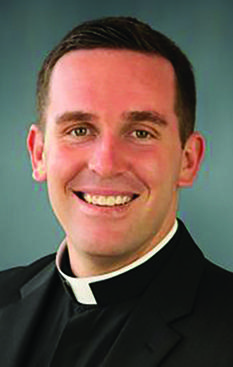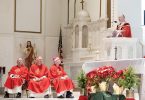
by Therese Horvat
Special to The Leaven
“Now two others, both criminals, were led away with him to be executed. When they came to the place called the Skull, they crucified him and the criminals there — one on his right, the other on his left.
“Now one of the criminals hanging there reviled Jesus, saying, ‘Are you not the Messiah? Save yourself and us.’
“The other, however, rebuking him, said in reply, ‘Have you no fear of God, for you are subject to the same condemnation? And indeed, we have been condemned justly, for the sentence we received corresponds to our crimes, but this man has done nothing criminal.’
“Then he said, ‘Jesus, remember me when you come into your kingdom.’
“He replied to him, ‘Amen, I say to you, today you will be with me in Paradise’” (Lk 23: 32-33, 39-43).

There were three men crucified on Calvary that most holy day almost 2,000 years ago.
One was an unrepentant criminal.
The second came to be known as “the good thief,” traditionally called St. Dismas.
And the third is revered as Jesus, our savior and redeemer.
As Holy Week 2022 approaches, three archdiocesan priests reflected on the significance of the story of the good thief in Luke’s Gospel. One of the priests is approaching the 50th anniversary of his ordination; the other two are newly ordained.
Mercy exemplified
In their commentary on Luke’s Gospel, the U.S. bishops tell us, “No gospel writer is more concerned than Luke with the mercy and compassion of Jesus.”
Ordained in May 2021, Father Thomas Maddock describes the Good Thief account as a “message of mercy.”

The associate pastor of Christ the King Church and chaplain of Hayden High School, both in Topeka, believes, “This account embodies God’s desire for all of us to be with him in paradise. The Good Thief turns to Jesus and asks for forgiveness. The exchange that occurs signifies that Jesus opens the doors to paradise for everyone.”
Newly ordained Father Luke Doyle, associate pastor of St. Michael the Archangel Parish, Leawood, points out that the good thief has been known as “the thief who stole heaven.”
The good thief passage represents our belief, he said, that because of Jesus’ life, death and resurrection, suffering and death do not have the last word — God’s mercy does.
“Mercy is love that chooses to suffer with and to suffer for people who are worthy of love — all of us,” said Father Doyle. “Jesus chooses to enter into suffering to heal us, his friends. He comes to show us the way to abundant life. He offers us the gift of humble confidence that we can welcome him to live in our own brokenness and woundedness.”

Father Dennis Wait, who is preparing to celebrate 50 years of priesthood soon, has developed over the years a deep appreciation for the story of the good thief.
And he takes this New Testament passage personally.
“With Jesus, I always have the opportunity for forgiveness,” said Father Wait. “When things look impossible, Jesus makes them possible. He gives the good thief direct knowledge that not tomorrow, not the next day, but that today he will be with Jesus in Paradise. The good thief dies in peace.”
Character connections
Father Wait, who has served in parish and archdiocesan ministries and was the founder and spiritual director of Sanctuary of Hope in Kansas City, Kansas, for 25 years, identifies with the good thief in the scriptural account. He admires that the man admits his wrongdoing and defends Jesus in his words to the other thief. The good thief allows himself to be transformed by Jesus’ forgiveness.

Father Doyle also associates with the good thief, whom he describes as “speaking for me personally and for all God’s people.” He believes that “we get to know Jesus when we allow ourselves to meet him in a communion of wounds.”
“Jesus takes on all pain, all the evil that has ever occurred,” he added. “He takes it all upon himself, and the consequences of sin — pain, suffering and evil — die in the heart of Jesus and his ultimate mercy.”
At different times, Father Maddock said he identifies with each of the three men crucified on Calvary. The unrepentant thief is someone who appears frustrated or angry with God; he challenges Jesus’ power.
“If things are not going my way,” said Father Maddock, “I can enter into this mindset and want God to do something about the situation.”

At other times, Father Maddock shares a kinship with the repentant sinner. Like the good thief, the newly ordained priest feels blessed with the faith to acknowledge Jesus as his Lord and savior who died on the cross for him.
Since becoming a priest, Father Maddock has also come to identify with Jesus in this account. He considers being a minister of God’s mercy in the sacrament of reconciliation a beautiful gift. He encourages the practice of the sacrament as a faith-filled way to experience this mercy.
Father Doyle, meanwhile, became a priest because he has known the healing power of Jesus’ love in his own life.
“Through my vocation, I believe I am sent by Jesus to help heal others so they can be a source of healing for other people,” he said.
‘Remember me’
The good thief’s request to be remembered by Jesus in his kingdom resonates deeply with Father Wait.
“By his expression and then his words,” he said, “Jesus communicates that he will never forget the good thief — or us.”
“The account of the good thief is a beautiful reminder to all of us to invite Jesus to be with us where we are most broken and wounded,” agreed Father Doyle. “That’s where true healing occurs.”

Father Maddock has found singing the hymn “Jesus, Remember Me” with others to be a powerful witness to their longing for God and his mercy.
“As a priest, this makes me want to show God’s mercy to them,” he said.
Modern-day parable of mercy
Early in his priesthood, Father Maddock prepared to celebrate the funeral of an older man. When he met with family members to gain insights, they didn’t sugarcoat the man’s life; they acknowledged that he struggled with his faith and was not a churchgoer.
During the last months of his life, however, thanks to his wife who prayed the rosary daily at his bedside, the man opened his heart to faith.
Father Maddock chose the good thief passage for the funeral Mass’ Gospel. Sharing the deceased man’s story in this context proved very moving, he said. Both stories demonstrate that no one is ever too lost for God.
“God never stops pursuing us — even to the last moments — to bring us into his kingdom,” he said.






